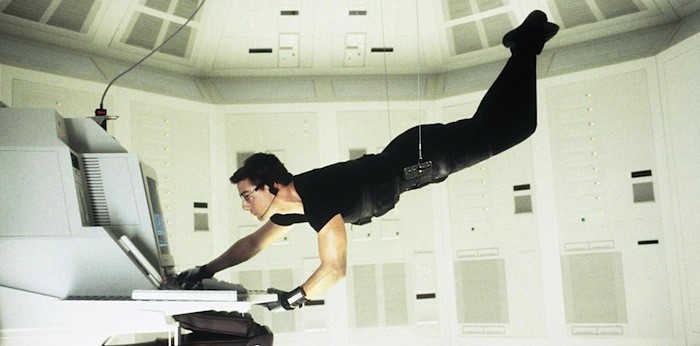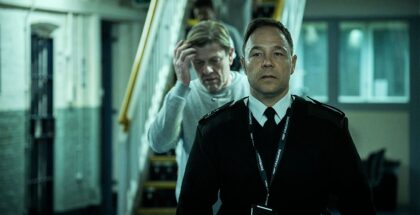VOD film review: Mission: Impossible (1996)
Review Overview
Cruise
8De Palma
7Schifrin
8David Farnor | On 23, Jul 2018
Director: Brian De Palma
Cast: Tom Cruise, Jon Voight, Ving Rhames, Emmanuelle Beart
Certificate: 15
Dumm. Dumm. DUM DUM. Those four notes are some of the most recognisable in the soundtrack world, thanks to Lalo Schifrin’s iconic, impossibly cool Mission: Impossible theme. That they’re still recognisable today is thanks to another timeless name: Tom Cruise. The movie star’s movie star, Cruise’s genuine Hollywood A-list status lit up like a fuse in 1996, when his debut as a producer placed him right in the middle of a blockbuster with big franchise potential. There’s something wonderfully anachronistic about taking a huge name and partnering it with something so old-fashioned and, in particular, ensemble-focused – a juxtaposition only topped by the decision to get Brian De Palma to direct it. But like those four notes, one they’re put together in the right order, the combination works and sounds entirely natural – and still lingers in your memory years later.
It took a long time to get that balance right, though, with multiple scripts and rewrites still flying around as the movie entered pre-production – they had some action sequence ideas, courtesy of De Palma, but only a wireframe plot to hang it on. David Koepp and Robert Towne ultimately penned the final version, and the end result is a telling mix of old-school espionage and cutting-edge Cruise control. You can see it in the way the film carefully steers away from the source material, even as it stays true to it: there are missions, there are cool gadgets, and there are messages that self-destruct; but there’s also a new hero in town, as Jon Voight’s Jim Phelps (the star of the TV show) is bumped off shortly into the runtime, making way for the introduction of Ethan Hunt (Cruise).
That happens during a set piece framed around the US Embassy and Prague (and the protection of a NOC List containing agents’ secret identities), and that low-key, non-explosion-filled sequence sets the tone for the whole outing. The focus here is on spying, not shooting; the central stunt, which needs no introduction, doesn’t involve skyscrapers or guns, but one man hanging from a ceiling in an empty room, trying to use a floppy disk drive. Brian De Palma turns out to be a natural fit for that environment, as he ramps up the dutch tilt and leans heavily on his favourite themes of voyeurism and noir-tinged duplicity. (After all, what is spying but looking intently at someone without them knowing?)
The plot, strangely, was heralded by many as indecipherable at the time, but it’s classic wrong-man-on-the-run stuff: Ethan Hunt is framed for the death of his team, leading him on a chase to prove his innocence and expose the CIA mole who set him up. There are deft touches along the way, as Hunt pieces together the plot before the other characters do and props introduced in the opening scenes drop crucial clues to the mystery, but this is Hollywood action 101, and Cruise is the perfect man to bring that modern sensibility to the Mission: Impossible brand.
It’s here that the actor started to do his own stunts for the series, from blowing up an extravagant fish tank in a restaurant to climbing along a train while dodging a helicopter, and his commitment is only rivalled by his easygoing charisma. He turns Hunt’s generic leading man qualities into something genuinely engaging; by the time he’s suspended mid-air and catching a drop of sweat in his hand to stop a pressure-sensitive floor alarm from going off, you’re completely hooked by his efforts. It’s a masterclass in using silence to build tension; an agile balance of De Palma and Cruise’s signature talents.
Combined with a sense of humour (courtesy of Ving Rhames’ scene-stealing hacker Luther and Vanessa Redgrave as arms dealer Max) and a crucial-turning-point use of the face masks that made the series so memorable, Mission: Impossible emerges not as an uneven 90s star vehicle, but as the ideal building block for a future franchise. It’s no coincidence that it’s the closest the series has felt to the original TV show, even to the point where that can excuse some of the tin-eared dialogue (watch out for laptops that have an “artificial intelligence risk chip”). The last item stitching it all together? Danny Elfman’s score, which deftly arranges Lalo Schifrin’s music with orchestral flair, fusing mainstream action with an intriguing study of deception and distrust – and cementing those four notes in cinema history.




















